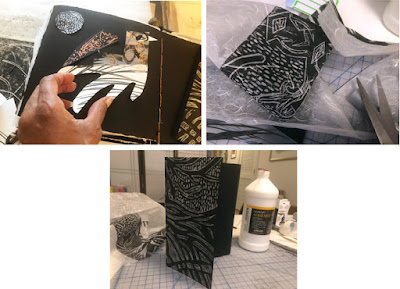GAIL'S CONTRIBUTION TO KAMALA'S BOOK
This mask represents the "metaphoric mask" that my ancestors had to wear to disguise their feelings and disappointment while negotiating through a racist American society. However, through further research it is also a fact that they had to disguise how smart they were as it relates to knowing how to read and speak proper English.
Literacy threatened the major justification of slavery--that black people were"less than human". Therefore, it was to the slave's advantage to express "bad English" to whites because, as Fredrick Douglass (1817-1895) said, "Ignorance is a high virtue in a human chattel; and as the master studies to deepen the slave's ignorance, the slave is cunning enough to make the master think he succeeds." (Paulette Brown-Hinds, Black English during Slavery).
In Kamala's book, half of the mask opens to reveal the inside of the page. There, you will find the shape of Africa with a sampling of names of different languages spoken throughout the continent. I added a target, symbolic of the magnitude of kidnapped Africans sold and separated from their own individual countries and language communities. Those that survived the transatlantic voyage were forced to find a way out of no way, by developing ways to communicate with each other. They did so through sign language, facial expressions, rituals, code words, songs, symbols, dance, drumming and slang. Through the years, the resilience of African languages have infiltrated languages around the world with their source hidden in plain sight.
Within the target, it was my intent to present a sampling of the different languages of Africa and to identify how communication was a major obstacle, acerbated by the purposeful separation of people from the same countries. There have been a steady influx of words deciphered, adapted, abbreviated, blended and retained from African languages. As a result different creoles and dialects evolved while many words and expressions from Africa became part of American English and European languages.
Here are a few African words hidden in plain English:
boogie- from Wolof or Sierra Leone, to dance
banana- from West African, possibly Wolof
dig- from Wolof, to sense, understand or appreciate
hip- from Wolof, one with eyes open
jazz- from Mandinka, jasi, Temne, yas
mojo- from Fula, medicine man
yam- from Fula, sweet potatoes
basenji- breed of dog from the Congo
safari- from Swahili, travel
goober- Bantu, peanut
gumbo- from Bantu, okra
impala- from Zulu.
This is a sample of the development of my composition for my page in Kamala's book.






Gail,
ReplyDeleteThank you for the courage to be powerful.
Peace and Love,
Verna
Thanks Verna
DeleteThanks Verna
ReplyDeleteMy first entry was not saved-- This is an introspectful presentation that ties the origins of words from the transatlantic slave trade, such as dig, hip, safari. I appreciate the beautiful art that was inspired by language.
ReplyDelete